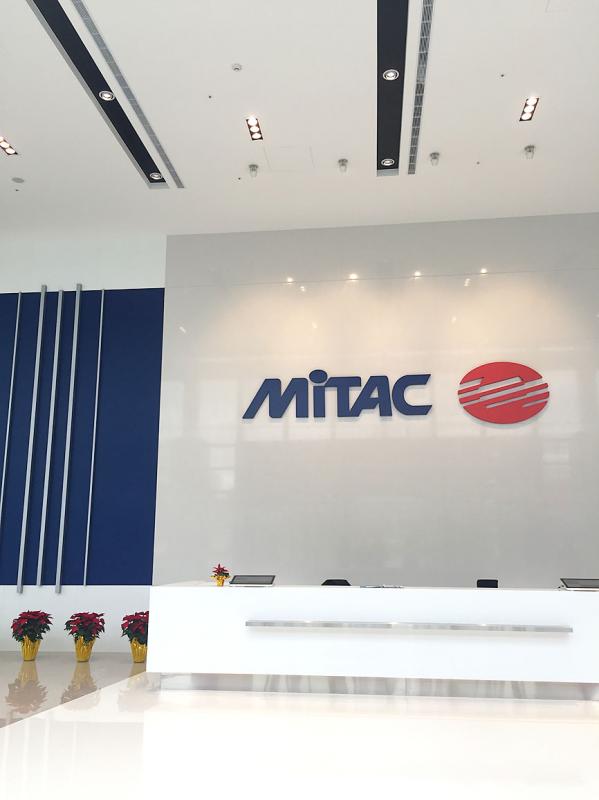MiTAC Holdings Corp (神達控股) yesterday announced a US$7.2 billion merger between its investment company, Synnex Corp, and information technology distributor Tech Data, which would create a world-leading information technology (IT) distributor if approved.
Synnex and Tech Data, both based in the US, have entered into a definitive merger agreement, under which the two companies would combine in a transaction valued at about US$7.2 billion, including net debt, Taoyuan-based MiTAC said.
“The combined company, with about US$57 billion in estimated pro forma annual revenue, and a team of over 22,000 associates and colleagues, will provide customers and vendors with expansive reach across products, services and geographies to accelerate technology adoption,” MiTAC said in a statement on its Web site.

Photo: Vanessa Cho, Taipei Times
If the deal closes, Synnex shareholders would own about 55 percent of the combined entity, with Apollo Global Management Inc, which bought Tech Data in June last year, owning about 45 percent, the statement said.
The transaction is expected to be completed in the second half of this year, subject to the satisfaction of customary closing conditions, including approval by Synnex stockholders and regulatory approval, it said.
Synnex president and chief executive officer Dennis Polk said the company is excited to partner with a world-class industry leader such as Tech Data and believes that the move would benefit all stakeholders.
“This transaction allows for accelerated revenue and earnings growth, an expanded global footprint and the ability to drive significant operating improvements, while continuing to create shareholder value,” Polk said.
Through the merger, Synnex and Tech Data are expected to create the world’s largest IT distributor, which could generate US$100 million of optimization and synergy benefits in the first year after the closing, and about US$200 million by the end of the second year, media reports have said.
“The combined company will have a global footprint that serves more than 100 countries across the Americas, Europe and the Asia-Pacific region, and a broad, diversified portfolio of more than 200,000 product and solutions offerings,” Synnex said.
“This meaningful scale will provide increased value and purchasing efficiencies to the combined company’s 150,000 customers and more than 1,500 vendors, and enable it to accelerate technology adoption and attract the world’s most innovative OEMs [original equipment manufacturers],” said the US firm, which provides business-to-business IT services.

South Korea’s equity benchmark yesterday crossed a new milestone just a month after surpassing the once-unthinkable 5,000 mark as surging global memory demand powers the country’s biggest chipmakers. The KOSPI advanced as much as 2.6 percent to a record 6,123, with Samsung Electronics Co and SK Hynix Inc each gaining more than 2 percent. With the benchmark now up 45 percent this year, South Korea’s stock market capitalization has also moved past France’s, following last month’s overtaking of Germany’s. Long overlooked by foreign funds, despite being undervalued, South Korean stocks have now emerged as clear winners in the global market. The so-called “artificial intelligence

Chinese artificial intelligence (AI) start-up DeepSeek’s (深度求索) latest AI model, set to be released as soon as next week, was trained on Nvidia Corp’s most advanced AI chip, the Blackwell, a senior official of US President Donald Trump’s administration said on Monday, in what could represent a violation of US export controls. The US believes DeepSeek will remove the technical indicators that might reveal its use of American AI chips, the official said, adding that the Blackwells are likely clustered at its data center in Inner Mongolia, an autonomous region of China. The person declined to say how the US government received

‘SEISMIC SHIFT’: The researcher forecast there would be about 1.1 billion mobile shipments this year, down from 1.26 billion the prior year and erasing years of gains The global smartphone market is expected to contract 12.9 percent this year due to the unprecedented memorychip shortage, marking “a crisis like no other,” researcher International Data Corp (IDC) said. The new forecast, a dramatic revision down from earlier estimates, gives the latest accounting of the ongoing memory crunch that is affecting every corner of the electronics industry. The demand for advanced memory to power artificial intelligence (AI) tasks has drained global supply until well into next year and jeopardizes the business model of many smartphone makers. IDC forecast about 1.1 billion mobile shipments this year, down from 1.26 billion the prior

FORTUNES REVERSED: The new 15 percent levies left countries with a 10 percent tariff worse off and stripped away the advantage of those with a 15 percent rate In a swift reversal of fortunes, countries that had been hardest hit by US President Donald Trump’s tariffs have emerged as the biggest winners from the US Supreme Court’s decision to strike down his emergency levies. China, India and Brazil are among those now seeing lower tariff rates for shipments to the US after the court ruled Trump’s use of the International Emergency Economic Powers Act to impose duties was illegal. While Trump subsequently announced plans for a 15 percent global rate, Bloomberg Economics said that would mean an average effective tariff rate of about 12 percent — the lowest since